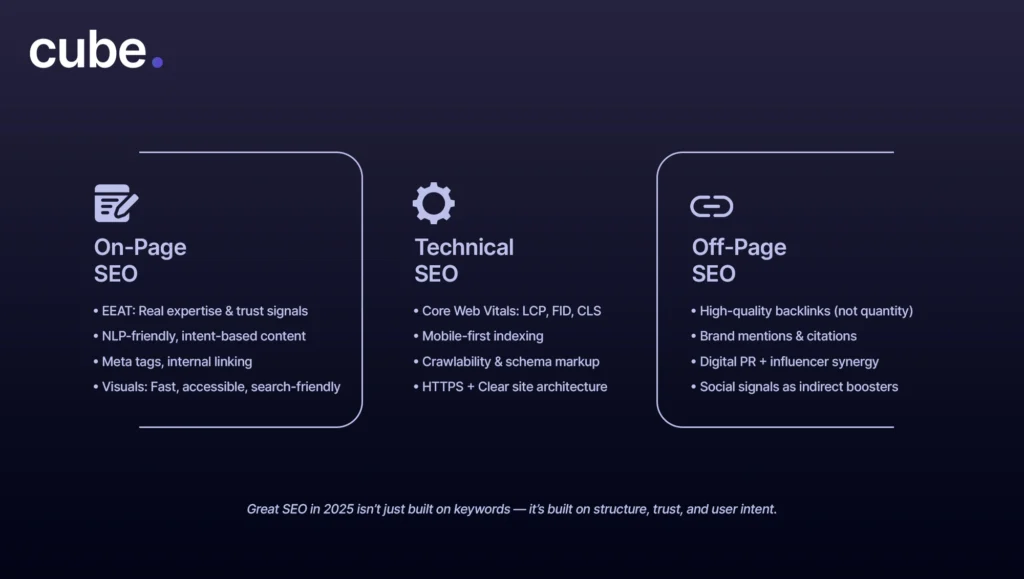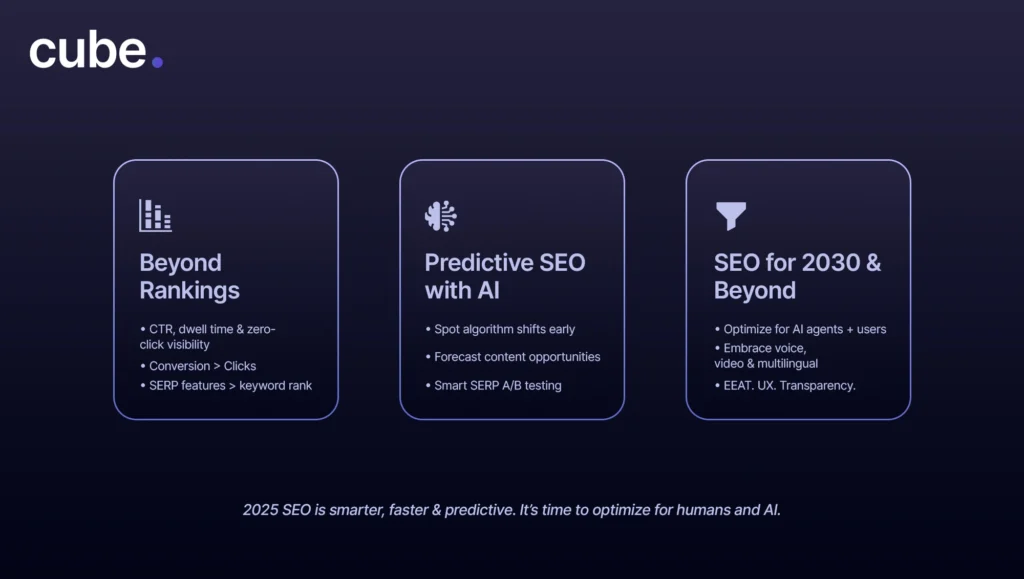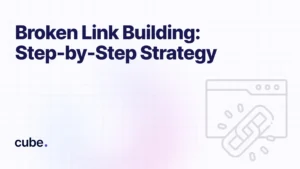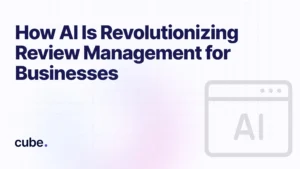Is SEO still relevant for your brand in 2025? While you might have seen clickbait claiming SEO to be dead in the age of AI-assisted search, they couldn’t be further from the truth. In 2025, SEO will be more dynamic than ever, driven by AI, user intent, and an evolving algorithm landscape.
Over the years, SEO has shifted from mere keyword stuffing to a user-centric approach, emphasizing quality content, search intent, and seamless experiences. Google’s AI-powered updates, voice search, and mobile-first indexing have redefined optimization strategies.
Staying ahead in SEO is crucial as search engines prioritize fast, relevant, and engaging content. Businesses that adapt to changes early gain a competitive edge, ensuring long-term digital success.
With personalization, trust, and interactivity at the forefront, mastering SEO means embracing innovation and keeping pace with search evolution. In this blog, we will unpack what SEO means in 2025.
Understanding Search Engines in 2025
Search engines now are smarter, faster, and more intuitive than ever. AI and machine learning now play a central role in ranking, analyzing behavioral data, engagement, and search patterns to deliver hyper-relevant results. Google’s algorithm has evolved to prioritize user intent, context, and content quality over keywords alone.
A major game-changer is Google’s Search Generative Experience (SGE). That is, AI-generated summaries with answers directly within search results. Alternative engines like Bing, DuckDuckGo, Brave, and You.com are also gaining traction for their focus on privacy, speed, and innovative AI features. These platforms offer diverse opportunities for brands to diversify their SEO strategies.
Additionally, conversational queries – voice search and chatbot-style interactions – are becoming the norm, pushing marketers to create more natural, question-based content tailored to these evolving search habits. This shift has reduced click-throughs to websites, making it crucial for brands to optimize for visibility within AI-generated snippets. So yes, you might be seeing a dip in traffic to your website’s pages. But that doesn’t (and shouldn’t) mean less visibility for your brand and products.
The Core Pillars of Website SEO in 2025

Technical SEO
Even in 2025, technical SEO begins with Core Web Vitals. That means measuring loading speed, interactivity, and visual stability. Google emphasizes performance benchmarks like Largest Contentful Paint (LCP), First Input Delay (FID), and Cumulative Layout Shift (CLS) to assess user experience.
Mobile-first indexing is the more crucial metric, meaning search engines prioritize the mobile version of your site, so seamless mobile UX isn’t just ideal, it’s essential. Ensuring your website is crawlable and indexable means using proper robots.txt, XML sitemaps, and canonical tags. Structured data and updated schema markups are also important to help search engines understand your content more deeply, increasing eligibility for rich results.
HTTPS is still a trust signal, enhancing both user safety and SEO. Lastly, intuitive site architecture and clean navigation help both users and bots explore your site efficiently, boosting engagement and discoverability.
On-Page SEO
Content quality is paramount, with Google’s EEAT – Experience, Expertise, Authoritativeness, and Trustworthiness – still serving as the gold standard. This means content that demonstrates real-life application, credibility, and insight ranks higher. Want to know how? Here is how product-led content can turn your website into your biggest sales engine.
Natural Language Processing (NLP) impacts how search engines understand context and semantics, making content relevance more important than sheer keyword density. If you are a brand looking to turn your website into a revenue engine, your keyword research should focus on long-tail, conversational, and intent-based queries.
Internal linking remains a powerful tool to connect closely-related content and helps to distribute link equity while keeping users engaged. Optimizing meta titles, descriptions, and header tags also enhances both click-through rates and readability.
Don’t overlook image and multimedia optimization. With the rise of visual search and AI-powered indexing, descriptive alt text, fast-loading formats (like WebP), and video schema all improve visibility.
Off-Page SEO
In 2025, the quality of your backlinks trumps quantity. AI-assisted search engines reward links from high-authority, niche-relevant sources over mass-produced backlinks. Digital PR and value-driven content are the keys to earning those coveted links, making storytelling and original insights powerful SEO tools.
Beyond backlinks, brand mentions and unlinked citations are also becoming ranking signals, as they indicate a site’s real-world authority and relevance. While social signals (likes, shares, and engagement) don’t directly impact your website’s rankings, they influence visibility, traffic, and brand trust, indirectly boosting SEO.
This means that the synergy between influencer marketing and SEO continues to grow, with influencers’ mentions and content driving referral traffic and authority, especially when linked to strategic landing pages.
User Experience (UX) and SEO
Google’s current SEO ranking metrics consider how users interact with your site as a major ranking factor, making UX an important metric that decides your digital presence. Metrics like time on site, dwell time, and bounce rate also feed into Google’s assessment of quality.
Another critical metric is Page speed, as sluggish load times cause drop-offs, especially on mobile. Tools like Lighthouse and PageSpeed Insights help diagnose and fix slow elements. Accessibility and inclusive design also matter, ensuring screen reader compatibility, keyboard navigation, and readable fonts contribute to both user satisfaction and compliance.
Reducing bounce rates requires better engagement: interactive content, clear CTAs, and intuitive design all play a role. Finally, with the rise of zero-click searches and featured snippets, optimizing for SERP features (like People Also Ask, carousels, and knowledge panels) ensures your content still grabs attention even when users don’t click through.
Advanced SEO Strategies for 2025
While AI-generated content isn’t categorically penalized by search engines, it must add genuine value to your audience to bring in traffic. In 2025, AI tools like ChatGPT and Gemini will be used to draft, refine, and brainstorm content ideas, but human oversight is crucial for tone, context, and originality. The secret? Blend AI with real insights, unique perspectives, and human editing to craft content that ranks. Here are some other secrets to include in your 2025 SEO strategy:
- Voice search optimization focuses on natural, conversational queries. With smart assistants embedded in cars, homes, and phones, users often ask full questions. Optimize by using long-tail keywords, question phrases, and FAQ-style content.
- Video SEO is also booming. So, optimizing titles, descriptions, and video schema is essential to rank on both YouTube and Google. Add transcripts, closed captions, and strong thumbnails to boost engagement and visibility.
- Local SEO leverages “near me” queries. This means optimizing for hyperlocal targeting with Google Business Profiles, localized content, and review management.
- Optimize for featured snippets and People Also Ask (PAA) to boost your content’s visibility even in zero-click SERPs. Structure answers, use headers strategically, and aim to directly answer common search questions in under 50 words.
AI tools like ChatGPT, Bard, and Gemini are redefining how content is created, optimized, and searched. Marketers are now using these tools not only for ideation but also for analyzing SERPs, predicting content gaps, and crafting semantic-rich copy. While they don’t replace human creativity, they accelerate content workflows and allow deeper SEO personalization.
Measuring SEO Success in 2025
Tracking SEO success in 2025 goes far beyond traditional keyword rankings. Gone are the days of tracking just impressions and clicks. Understanding user behavior and satisfaction is more critical than ever, especially with the rise of AI summaries and featured snippets reducing direct traffic.
Today’s marketers focus on metrics like click-through rate (CTR), dwell time, engagement rate, conversion rates, and zero-click visibility. Best SEO tools now integrate AI capabilities. AI-powered analytics, like that of Cube, go a step further with predictive SEO, identifying future content opportunities and spotting algorithm shifts early. These tools forecast what types of content will perform best based on trend analysis.
Conducting efficient SEO audits is also easier now, thanks to automation. Audits now include technical health, content gaps, and even voice search readiness. A/B testing should also be used to improve SERP elements – like headlines, meta descriptions, and internal linking – so brands can iteratively boost rankings and engagement.
The Future of SEO: What’s Next?

As AI evolves rapidly, many wonder: Will traditional SEO exist in 2030? The short answer is “Yes, but it will look radically different.” Search won’t disappear, but it will become more conversational, contextual, and predictive. The role of marketers will shift from mere optimization to strategy, storytelling, and UX design.
AI agents will act as intermediaries by searching, comparing, and deciding for users. This means brands will have to optimize for both people and AI decision-makers. This means structured data, product specifications, and transparent content will be critical to stand out in this ecosystem.
While predicting Google’s algorithm updates is becoming more difficult due to AI-powered real-time learning systems, fundamentals like EEAT, fast UX, and semantic relevance will remain evergreen strategies. So, to future-proof SEO, brands should invest in omnichannel content, voice/video strategies, AI integration, and ethical, transparent practices.
And, to dominate SEO in 2025, focus on:
- Creating value-rich content with human-AI collaboration
- Using AI tools for insights and predictive optimization
- Enhancing site speed, UX, and accessibility
- Diversifying with video, local, and multilingual strategies
- Monitoring metrics like CTR, dwell time, and SERP features
SEO is no longer just about keywords; it’s about relevance, experience, and adaptability. Brands that invest in future-ready strategies today will lead the digital race tomorrow. Keep learning, testing, and evolving to stay on top. And to know how we can do that for your brand, book a demo call with us today.


